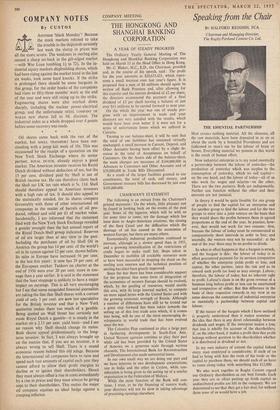COMPANY NOTES
By CUSTOS
ANOTHER 'black Monday'! Because the stock markets refused to take the trouble in the shipyards seriously last week the slump in prices was all the more severe. The weakness in sterling also caused a sharp set-back in the gilt-edged market —with War Loan tumbling 1# to 721. In the in- dustrial equity markets shipbuilding shares, which had been rising against the market trend in the last six weeks, took some hard knocks. If the strike is prolonged there should be some bargains in this group, for the order books of the companies had risen to fifty-three months' work at the end of the year and were still rising up to the strike. Engineering shares were also marked down sharply, including the nuclear power-electrical group, and the unfortunate STEEL COMPANY OF WALES new shares fell to 9d. discount. The industrial index as a whole dropped over 4 points before some recovery was made.
Oil shares came back with the rest of the market, but SHELL TRANSPORT have been out- standing with a jump last week of 10s. This was occasioned by the receipt of a quotation .on the New York Stock Exchange where its senior partner, ROYAL DUTCH, already enjoys a good market. The American investor receives his Royal Dutch dividend without deduction of tax, but the 15 per cent. dividend paid by Shell is net of British income tax. He can therefore claim back the Shell net UK tax rate which is 5s. 11d. Shell should therefore appeal to American investors with a high rate of tax. It should also appeal to the statistically minded, for its shares compare favourably with those of other international oil companies in the matter of barrels of oil pro- duced, refined and sold per El of market value. Incidentally, I am informed that the statement filed with the New York Stock Exchange revealed a greater strength than the last annual report of the Royal Dutch-Shell group indicated. Reserves of oil are larger than at any time in the past. Including the purchases of oil by Shell Oil in America the group has 14 per cent. of the world's oil in its system against 12 per cent. shown before. Its sales in Europe have increased 56 per cent. in the last five years : it now has 29 per cent. of the European market. Tankers on charter at the end of 1956 were over 20 per cent. more in ton- nage than a year earlier. It is said in the statement that the Suez stoppage is unlikely to have a major impact on earnings. This is all very encouraging but I see that some misguided financial journalists are taking the line that Shell shares with a current yield of only 3 per cent. are pow too speculative for the British investor and that a New York quotation makes them too much of a gamble. . Being quoted on Wall Street has certainly not made Royal Dutch a gamble—it is steady in the market on a 2.15 per cent. yield basis—and I see no reason why Shell should change its status. Both shares appeal predominantly to the long- term investor. In fact, I was always brought up on the maxim that, if you are an investor, it is always wrong to sell Shell. There is a sound economic reason behind this old adage. Because the international oil companies have to raise and spend such vast amounts of capital each year they cannot afford to allow their profit margins to decline or to ignore their shareholders. Henc6 they must always offset a rise in costs immediately by a rise in prices and they must always be giving sops to their shareholders. This makes the major oil company equities an ideal hedge against a creeping inflation.


































 Previous page
Previous page